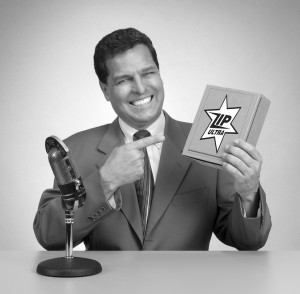Confessions of a (Former) Impulse Buyer
“Don’t buy when you’re excited, and don’t sell when you’re afraid; you lose big in both cases.”
– Eben Pagan
When Spending Becomes a Problem
 Ten or twelve years ago, I had a wake-up call one day when the mailman dropped off a package on my doorstep. It contained a product I had seen on a late-night “info-mercial.” I remembered watching the commercial. But I had no memory of ordering the product.
Ten or twelve years ago, I had a wake-up call one day when the mailman dropped off a package on my doorstep. It contained a product I had seen on a late-night “info-mercial.” I remembered watching the commercial. But I had no memory of ordering the product.
A bit of an insomniac/night owl, I would find myself wandering through the late-night television channels, which were heavy on infomercials in those days. Since up-leveling my income, I could actually BUY some of the things I used to only “look” at. And buy I did.
Within a few months, I had acquired skin moisturizers and toners, a spinning brush for my face, jewelry cleaner (that smelled suspiciously like watered-down Windex), exercise videos, car wax, and anti-cellulite cream, which arrived monthly until I stopped it.
To be honest, I barely used any of the things I had ordered from those late night purchases. Mostly, they just sat on a shelf (or two) in my hall closet and offered a shaming reminder of my impulse buying whenever I reached for the towels on the shelf below.
And now, I was staring at a box of miracle cleaner for my furniture and floors… that I didn’t even remember ordering.
Like someone confronted with photographic proof of what they did on a drunken binge, I had to face the facts:

Somewhere along the line from being a frugal 20-something waitress to a 30-something realtor with cash flow, I had become a shopaholic.
There were no obvious signs of damage. No creditors were calling. My bills were current. I paid off the airmiles Visa I used to make the purchases in full every few months. I could technically “afford” the purchases, but I knew it was time… time for a change!
As I broke the late-night shopping habit, I found that simple changes of habit made a HUGE difference.
First, I did more late night reading (or writing) and a lot less late-night TV. I slept better, and the books proved more enlightening and less pricey than the infomercials.
Secondly, when I did happen to see or hear an advertisement that sounded useful or compelling, I chose to wait. I could write down the phone number or website of the product, but I promised myself that I would not actually order the product for two days.
The healthy distraction helped, and the cooling off period was pure magic. I wrote down some websites and phone numbers at first, but I stopped buying things. I even stopped wanting things so much! Perhaps it was the realization that I could resist buying and that life would go on just as happily as before (if not moreso). The experience also laid the foundation for my philosophy on Intentional Spending (but that’s another post for another time.)
Are You Spending Intentionally, or “Accidentally”?
 The problem is this: when we use our emotional impulses to make financial choices, we aren’t looking at the situation through the proper lens. (See my post on Emotional Spending: Buying Love for more on this.)
The problem is this: when we use our emotional impulses to make financial choices, we aren’t looking at the situation through the proper lens. (See my post on Emotional Spending: Buying Love for more on this.)
Now, all financial decisions may have an emotional component -that’s not necessarily a bad thing. Sometimes emotion propels us to do the thing we “should” to do – such as purchase something that will help us grow, heal, prosper, or live joyfully… something that will serve us. We might become inspired to invest in ourselves, buy a worthwhile asset, or treat ourselves to a truly memorable experience.
Other times, we buy things on impulse that we don’t love, don’t value, or don’t even use. We’re left feeling foolish or perhaps like we’ve been “had.”
Worse yet, we trade our precious time and life energy to make the money we spend on things we don’t even use or value! Yuck.
The Rehabilitation of a Former Spendaholic
I’ve never racked up a hundred thousand in debt or declared bankruptcy, and I’m relatively frugal these days. But I remember what it’s like to have buyer’s regret and wonder, “Where did it all go?” when looking at my bank balance. And I’ve learned some lessons that have helped me (as well as my clients) tremendously.
1. If you simply wait to purchase, the urge often goes away.
A simple change of habits can help your inner impulse buyer remain in control of her actions and her money. See how you can “head spending off at the pass” by changing the behaviors that lead to mindless or impulsive purchases. For instance:
- Make shopping lists, don’t just wander through stores, malls, or Amazon.com without a plan.
- Stick to a shopping budget. Decide ahead of time how much you can spend.
- Find you’re going over your limit? Leave the cards at home and just take cash.
- Don’t browse catalogs or online stores unless you are buying a specific needed item.
- If you see an “impulse item” that wasn’t on your list, commit to a cooling off period. (I rarely go back to buy something after deciding to wait.)
2. Most things worth purchasing are worth contemplating purchasing.
 Consider what is important to you when making a purchase. I tend to look for quality, value, or perhaps music, clothing or food that I enjoy. You may use a different measuring stick. Beauty, comfort, or inspiration could be more important motivations for you than quality or value.
Consider what is important to you when making a purchase. I tend to look for quality, value, or perhaps music, clothing or food that I enjoy. You may use a different measuring stick. Beauty, comfort, or inspiration could be more important motivations for you than quality or value.
Consider what made good purchases or investments “good” for you, and why others leave you with regret.
Decide your values, priorities, budget and intentions ahead of time. This is not about deprivation – it’s about choice!
Make a list of the things you WANT to spend money on in the future, the things that are important to you. (These could be purchases, investments, experiences, or something else.) Then when you run across an impulse purchase opportunity, reference your list. It will remind you of your financial priorities, and often you’ll realize that the new thing is not as important as the other things you’re already saving for.
Your inner child may not thank you for reminding her that car repairs or dental work comes before an impulse outfit or vacation, but when you do go to Hawaii, you’ll go with peace of mind – and no toothache!
3. Research is your friend.
Buyer’s remorse can result if you’re quick to buy before doing a some research. Whether you’re buying a house, a car, or a cell phone, be smart about it. Ask for references, look up online reviews, or talk to those who have purchased the same thing. Consider what your trusted friends or advisors with experience in the area have to say.
4. Remember that “scarcity” is often artificial, and that not buying won’t hurt.
“Today only!” “Only 3 left!” “This offer won’t last!”
Scarcity is a proven sales tactic used to help a buyer make a decision or desire the “scarce” thing more. Auctions work on this same principle. Rather than thinking, “I have to buy this now!” consider that perhaps “Someone wants me to buy now.”
“Limited time offers” often aren’t, and if the deal really does go away, life goes on and you will likely be no worse for it. Consider that you have two choices to make – not only to buy or not to buy, but the choice of when to buy. It’s okay to let a buying opportunity slip through your grasp… you’ll have more opportunities later.
5. Use whatever method you use to get clarity with decisions.
Do you journal? Pray? Make a pro and con list? Get advice and then sleep on it? If money is an area of shame for you, you might tend to bypass the tried-and-true decision-making practices you use in other areas of your life.
 Don’t be afraid if a decision contains emotion, but make sure you aren’t buying for the wrong reasons. It’s important to not just consider what to buy or how much to spend, but why you’re buying as well. Is the purchase you’re considering filling a real need, or just tickling an emotional longing that prompts you to buy?
Don’t be afraid if a decision contains emotion, but make sure you aren’t buying for the wrong reasons. It’s important to not just consider what to buy or how much to spend, but why you’re buying as well. Is the purchase you’re considering filling a real need, or just tickling an emotional longing that prompts you to buy?
In a recent workshop I attended, Rachel Cole talked about what it means to be a “well-fed woman” who understands her deeper hungers. Without self-awareness, we’ll find ourselves using a pint of ice cream or a shopping binge to feed our emotional needs.
Addictions tend to mask deeper needs by giving us a distraction that is temporarily pleasurable, and shopping addictions have been proven to affect the brain similarly to highly addictive drugs! Fortunately, I found kicking the shopping habit downright pleasurable when I replaced it with activities that were more satisfying.
6. Be savvy – do the math and know your rights.
The worst “purchase” decision I ever made was not technically a purchase, it was a lease. Somehow, I called to buy a Dell computer, but after a long talk with the salesperson, I found myself leasing not one, but two computers. (A desktop and a laptop.) There was “no interest” and hey, it’s “tax-deductible,” which sounded good, in theory. I could easily manage the payments, and they would stretch the purchase out over time.
However, I didn’t do the math. There was no “interest,” technically, but that was really a matter of semantics, as I discovered there were a whole lot of “finance charges.” The payments seemed affordable, but they equaled what I would have paid for a VERY high-interest loan.
Ouch!
I called back the next day and attempted to cancel. However, I was informed that because a lease is not technically a purchase, I had no 3-day right of rescission.
In the end, I would pay double what the computers were worth in only three years, at which point I was given the choice of buying the computers for above market value (as if I hadn’t already paid for them) or taking on two MORE years of payments!
(I made two more payments then quit, citing the deception of the salesman, my failed attempt to cancel, and the fact I had already overpaid as my reasons. I told the leasing rep that if the computers were of value to them, they were welcome to come and get them. No one ever came.)
ALWAYS do the math, don’t let anyone rush your decision, and if you don’t get what you thought you were getting, don’t forget you have 3 days right of rescission on most purchases! Don’t be afraid to ask for your money back, return something, challenge a financing company, ask for a better deal or a price match. And stay away from those leases with “low monthly payments” and “no interest”!
7. Make a decision and move on.
Don’t be so cautious or analytical with your purchases that it takes up too much valuable time or strips the enjoyment out of purchasing something you want. (I.e., it’s not worth hours of research to save $30 on a flight, nor is it worth aggravating your significant other with analysis paralysis. Sometimes the best decision is to simply make one!)
If you make a purchase then get buyer’s remorse after it’s a done deal, don’t beat yourself up. DO become a more savvy, patient, and intentional buyer in the future.
Is Over-Shopping a Problem?
 I’ve helped many people get intentional about their spending, stop stressing about money, and avoid or get out of consumer debt. (I have a secret weapon when it comes to debt for those who want to avoid or don’t qualify for bankruptcy.)
I’ve helped many people get intentional about their spending, stop stressing about money, and avoid or get out of consumer debt. (I have a secret weapon when it comes to debt for those who want to avoid or don’t qualify for bankruptcy.)
If those are results you’d like too, and your committed to making a change and willing to invest in yourself, contact me for a 30-minute exploration session to see if we might be a good match to work together. I have space for one or two new private clients right now.
This is marvelous advice. It provides depth, tips, empathy and authenticity. I will give all my shopaholic friends and family members the link to your website.
Thanks, Marcia!
What a spot-on post! Thanks for sharing your personal experience along with ways I can be smarter with money, too. I especially like this point — Use whatever method you use to get clarity with decisions. It is oh-so-easy to rush to spend money, especially if it involves my kids. Thanks much, Kate!
You’re welcome Lynn!